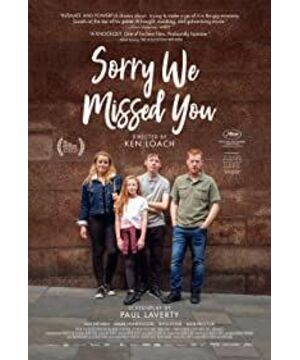[Watching the EU Film Festival] Comedy master Charlie Chaplin has a classic scene in "Modern Times" that is believed to be a household name: he works on a machine that is constantly running, and the repetitive and heavy work is overwhelming him. He turns people's noses like screws, tucked into the gears of assembly-line machines. Chaplin takes this to criticize the alienation of machines from humans in the era of the Industrial Revolution, which was the basic form of early capitalist control and exploitation of the working class. Unexpectedly, today, after more than half a century, this capitalism's alienation of laborers still exists, but it has become more subtle and cruel. Hidden behind the courier's scanner to monitor everything is a ruthless robot/computer program, which naturally cannot escape the sharp and critical eyes of British master director Ken Lodge. The bottom group speaks out. In this commercialized society where big data comes first, capital merchants have mastered the preferences and habits of consumers, which is naturally conducive to tailor-made services for different consumers, and also pays more attention to service experience, and the express logistics industry is the first to bear the brunt , speed and time become the primary key. As everyone knows, this kind of experience that satisfies consumers often has to sacrifice the sweat and overtime of workers in exchange for it.
The whole story is criticized around this core topic. This new work is a bit like the last Palme d'Or work "I Am Black". It is also the current era of high-speed consumption, and it is also about the protagonist's exposure to new industries (things) in the process. Difficulties that must be overcome and faced, and helpless choices between work and family. In addition, the director has collected the emerging social problems, from legal working hours to social aging, to the education of minors, all of which have precisely become the object of criticism under the lens.
However, this is obviously not as good as the previous work. It also depicts the life of the little people at the bottom. This time, there are a lot of less quiet emotional expressions, and replaced by the familiar dramatic plot and stereotyped characters, such as after a dispute between father and son. Tears fell from the mother's face, the daughter deliberately hid the car keys, the father was robbed of express packages, and even in the last scene, the father left a note and drove to work secretly. As a result, this series of carefully crafted plots leaves the narrative in a whirlpool of sensationalism that is beyond control. Forcibly involving social problems and family conflicts is not a clever technique, at least it is a bit surprising that it appears one after another in such master works as Kenlodge. It is very likely that the old director lacks in-depth understanding of the life of the contemporary working class, and his thinking still seems to be stuck in the society under the British Conservative Party in the 1970s and 1980s...
View more about Sorry We Missed You reviews











